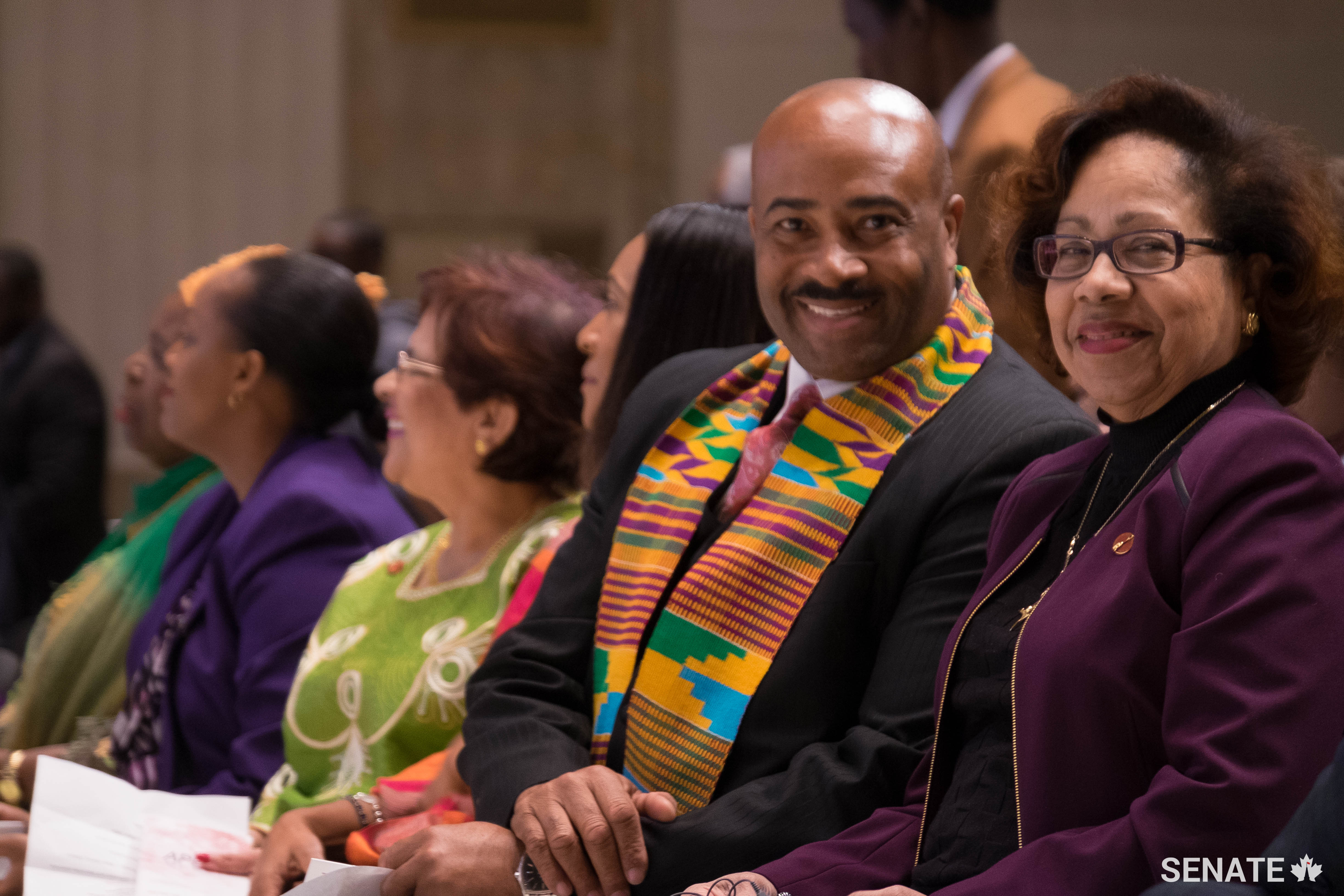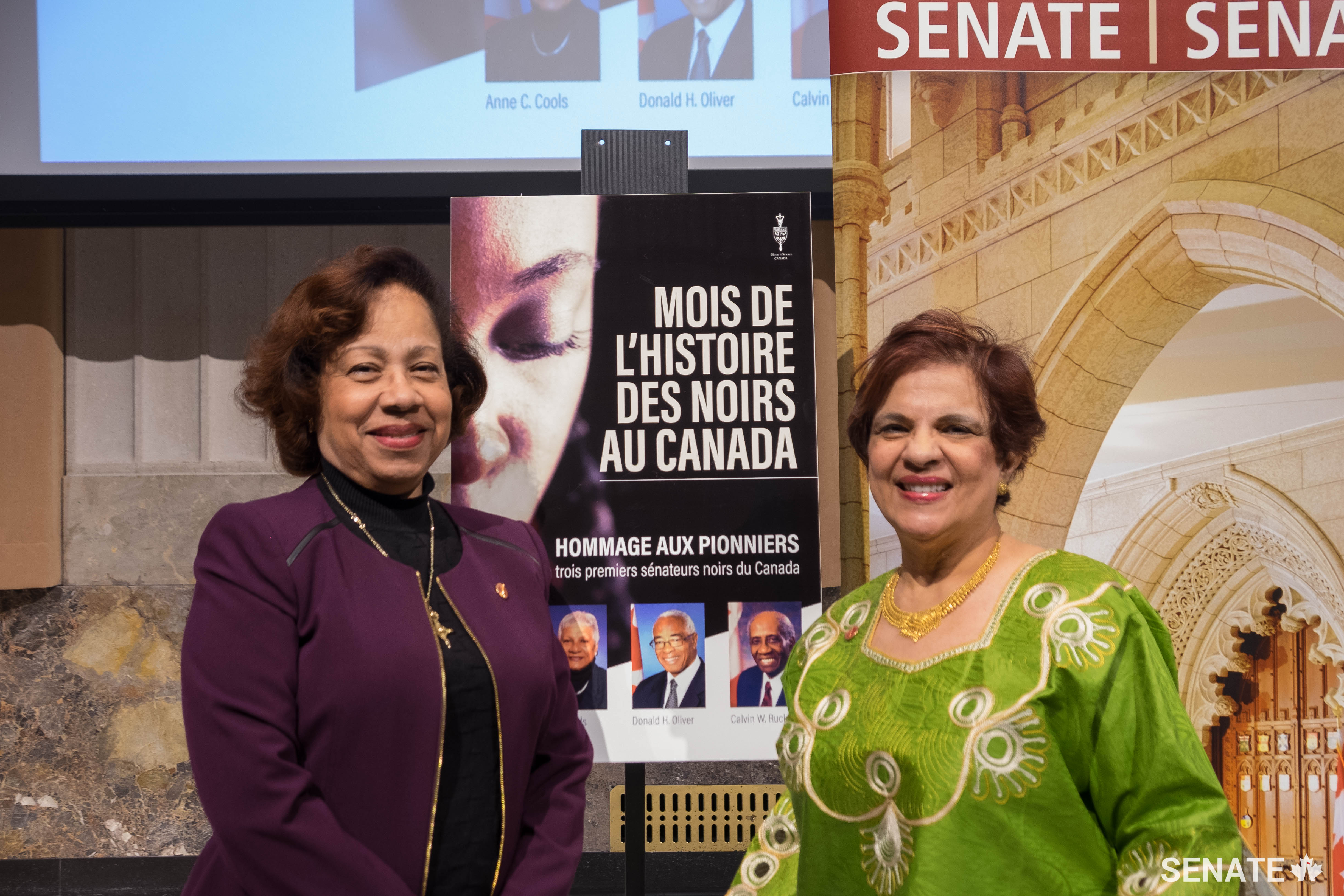Black History Month: Meet Senator Marie-Françoise Mégie

Black History Month recognizes the important contributions black Canadians have made to Canadian Society.
Senator Marie-Françoise Mégie was appointed to the Senate on November 25, 2016, by Prime Minister Justin Trudeau. Senator Mégie represents the province of Québec and the Senatorial Division of Rougemont. Born in Haiti, she arrived in Quebec in 1976. Senator Mégie’s professional career encompasses over 35 years as a family physician and nearly 30 years as a university professor. She is a member of the Senate Committee on Social Affairs, Science and Technology, the Senate Committee on Official Languages and the Senate Committee on Aboriginal Peoples.

Name a black Canadian (historical figure or present day person) who exemplifies courage and strength to you? Why?
Dr. Yvette Bonny, who was born in Haiti, was one of the first contingents of Haitians who arrived in Quebec. For me, she represents a “quiet strength.” She is black woman who emigrated when Haitian immigration was just beginning. In addition to specializing in pediatrics, she acquired a second specialty in hematology. Her determination and skill enabled her to earn an enviable place in her host country.
In April 1980, she performed the first bone marrow transplant at the pediatric bone marrow transplant unit at the Maisonneuve-Rosemont Hospital in Montreal. She headed this unit from 1980 to 1995 and carried out nearly 200 transplants during her career. She was also an associate professor at the University of Montreal’s Faculty of Medicine and found time to be socially involved in her community of origin and in her host country. She has received numerous awards and recognition for her professional and community involvement. Among a very long list of distinctions, she is a Chevalier of the Ordre national du Québec (2007) and a Member of the Order of Canada (2008).
What are the best lessons you learned growing up? What words of wisdom can you share with young Canadians?
One of the most valuable lessons I have learned from my parents is the importance of education. "You can’t go far without a diploma. It is the key to success in life.” They repeated this to my brothers and me whenever the opportunity arose. It became a mantra for us.
These words of wisdom have stuck with me throughout my life and I want to share them with future generations, especially as competition in the job market increases.

Name an artist, author, musician or performer whose work inspires you. Why? Can you suggest a book, song, dance, film or painting that more Canadians should know about?
The author who inspires me and whom I admire most is Dany Laferrière, an internationally recognized Haitian author who immigrated to Quebec in 1976 by circumstance and, like many immigrants, had a difficult start.
His first novel, “How to Make Love to a Negro Without Getting Tired,” thrust him into the limelight. This novel has been translated into several languages and was adapted for the screen in 1989.
Laferrière was a prolific author. He published many novels and has received numerous awards and recognition for his rich and captivating work. His novel “The Return” earned him the French literary prize, Medicis. He is a Member of the Order of Canada and, in December 2013, he was appointed to the Académie française (French only).
He is the first Haitian author and also the first Quebec and Canadian author to hold this prestigious honour.
As a Canadian of African descent, what does it mean to you to be a Senator? What kind of impact would you like to have in Canada's Parliament this session? Name one key policy issue that matters to you and explain why?
Some of the emails I received from young people in the community after I was appointed made me realize that I was a role model for them.
It’s also an honour for me to be able to contribute to building both the Canada of today and tomorrow.
Given my previous career, seniors’ well-being and end-of-life care are among the skills and experiences I will be able to share with my parliamentary colleagues to advance these issues.
Related articles
Tags
Committee news
Black History Month: Meet Senator Marie-Françoise Mégie

Black History Month recognizes the important contributions black Canadians have made to Canadian Society.
Senator Marie-Françoise Mégie was appointed to the Senate on November 25, 2016, by Prime Minister Justin Trudeau. Senator Mégie represents the province of Québec and the Senatorial Division of Rougemont. Born in Haiti, she arrived in Quebec in 1976. Senator Mégie’s professional career encompasses over 35 years as a family physician and nearly 30 years as a university professor. She is a member of the Senate Committee on Social Affairs, Science and Technology, the Senate Committee on Official Languages and the Senate Committee on Aboriginal Peoples.

Name a black Canadian (historical figure or present day person) who exemplifies courage and strength to you? Why?
Dr. Yvette Bonny, who was born in Haiti, was one of the first contingents of Haitians who arrived in Quebec. For me, she represents a “quiet strength.” She is black woman who emigrated when Haitian immigration was just beginning. In addition to specializing in pediatrics, she acquired a second specialty in hematology. Her determination and skill enabled her to earn an enviable place in her host country.
In April 1980, she performed the first bone marrow transplant at the pediatric bone marrow transplant unit at the Maisonneuve-Rosemont Hospital in Montreal. She headed this unit from 1980 to 1995 and carried out nearly 200 transplants during her career. She was also an associate professor at the University of Montreal’s Faculty of Medicine and found time to be socially involved in her community of origin and in her host country. She has received numerous awards and recognition for her professional and community involvement. Among a very long list of distinctions, she is a Chevalier of the Ordre national du Québec (2007) and a Member of the Order of Canada (2008).
What are the best lessons you learned growing up? What words of wisdom can you share with young Canadians?
One of the most valuable lessons I have learned from my parents is the importance of education. "You can’t go far without a diploma. It is the key to success in life.” They repeated this to my brothers and me whenever the opportunity arose. It became a mantra for us.
These words of wisdom have stuck with me throughout my life and I want to share them with future generations, especially as competition in the job market increases.

Name an artist, author, musician or performer whose work inspires you. Why? Can you suggest a book, song, dance, film or painting that more Canadians should know about?
The author who inspires me and whom I admire most is Dany Laferrière, an internationally recognized Haitian author who immigrated to Quebec in 1976 by circumstance and, like many immigrants, had a difficult start.
His first novel, “How to Make Love to a Negro Without Getting Tired,” thrust him into the limelight. This novel has been translated into several languages and was adapted for the screen in 1989.
Laferrière was a prolific author. He published many novels and has received numerous awards and recognition for his rich and captivating work. His novel “The Return” earned him the French literary prize, Medicis. He is a Member of the Order of Canada and, in December 2013, he was appointed to the Académie française (French only).
He is the first Haitian author and also the first Quebec and Canadian author to hold this prestigious honour.
As a Canadian of African descent, what does it mean to you to be a Senator? What kind of impact would you like to have in Canada's Parliament this session? Name one key policy issue that matters to you and explain why?
Some of the emails I received from young people in the community after I was appointed made me realize that I was a role model for them.
It’s also an honour for me to be able to contribute to building both the Canada of today and tomorrow.
Given my previous career, seniors’ well-being and end-of-life care are among the skills and experiences I will be able to share with my parliamentary colleagues to advance these issues.


